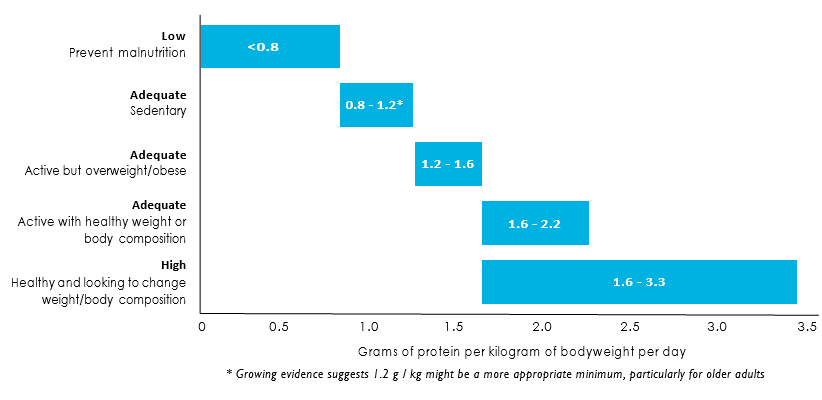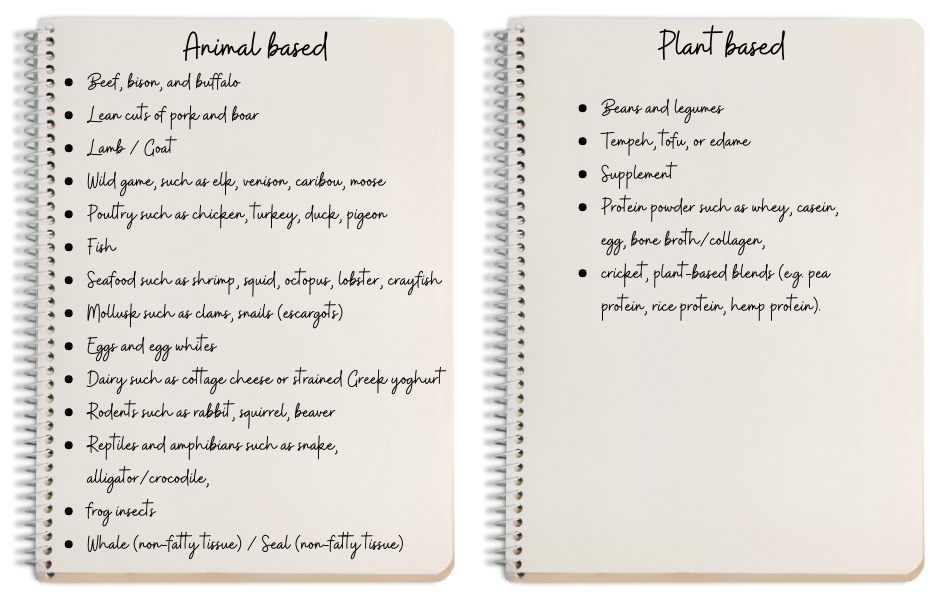One of the most common question I get asked is: how much protein do I need?
Ok, lets start with the basics.
What are proteins?
Proteins are crucial physiological molecules, involved in nearly every process that happens in our bodies.
Such as:
- cellular metabolism;
- sending messages within and between cells;
- enabling important chemical reactions; and
- creating structures.
Why is protein important?
Because they make up much of our body’s tissues such as muscle, connective tissues, skin, nails, hair, and a significant percentage of bone.
It can also increase levels of the hormone glucagon, and glucagon can help to control body fat.
It helps replace worn out cells, transports various substances throughout the body, and aids in growth and repair.
They are made up of amino acids, like Lego blocks that fit together in different ways. When we eat and digest complex proteins (say, in a steak or a piece of tofu), we break them down into peptides (two or more amino acids joined together) and amino acids. We then use those amino acids to make new things, or for other metabolic functions in our bodies.
Because they have many important jobs, and because they’re always being deconstructed and reconstructed, we need to eat a consistent supply of dietary protein to live and thrive.
How much protein do you need?
The exact amount will vary from person to person, depending on factors like:
- goals;
- age;
- body size and lean mass;
- physical activity level;
- overall health status;
- whether we’re pregnant/lactating; and/or
- whether we’re injured or ill.
Unless there’s a specific medical reason for a low intake, most people will benefit from eating relatively more protein.
Recommended protein intake by goals, activity, and body weight

As per the graphic above recent evidence suggests 1.2gr/kg of protein per day for a non-active person. This will vary according to your goals. Try to spread the same amount on each meal.
However, this amount is only to prevent protein deficiency. It’s not necessarily optimal, particularly for people such as athletes who train regularly and hard.
Can I eat too much protein?
If you overeat protein, this extra “portion” can be converted into sugar or fat in the body. However, it isn’t as easily or quickly converted as carbohydrates or fat, because the thermic effect (the amount of energy require to digest, absorb, transport and store it) is a lot higher than that of carbohydrates and fat.
You might have heard the statement that a high protein intake harms the kidneys. This is a myth. In healthy people, normal protein intakes pose little to no health risk. Indeed, even a fairly high intake – up to 2.8 g/kg – does not seem to impair kidney status and renal function in people with healthy kidneys.
How to measure food portions?
The easiest way is to use hand portions.
The basic measurement unit for protein is the palm.
For most people, a palm is about 85-115grs of a cooked high-protein food such as fish, chicken, or tofu yielding about 20-30 grams of protein. A larger person will have a larger palm of course while a smaller person a small one, the body size adapts the portions.



For highly active people:
- Add more portions (I.e 2 or 3 palms )
- Add more meals since it will be hard to digest it in one sitting
Adjust downwards if you have:
- Kidney or liver disease
- Certain metabolic diseases
- Problems with gastric emptying
- Homocystinuria
Where do I find protein?
You may already know the most common sources such as meat, Greek yogurt, beans and legumes. But it is important to know which meat, yogurt or beans to choose.
Use this traffic light to choose the right ones:

Plant based eaters
To reach the necessary amounts of protein for plant-based eaters include the more possible variety of legumes, beans, tubes, fruits and if necessary, use supplementation such as plant-based proteins to reach the target.
Supplement your diet if needed with:
- Casein
- Egg white
- Milk protein blend
- Bone broth/ collagen
- Whey
- Plant-based proteins (e.g. pea, hemp, rice proteins)
- Other such as EAA (essential amino acids, glutamine, Arginine and lysine.
Plan your meals
The best way to reach your intake goal is to plan ahead. Here you have a protein food shopping list:

How to track what you eat?
The easiest way is to make a tracking sheet. You can print it and put it on your fridge. It is a simple way to track portions of all main nutrients.

Take-home recommendations
- For basic protein synthesis, you don’t need to consume more than 1.4 to 2.0 g/kg of protein per day.
- The body needs its protein stores to be continually replenished, which means that you should consume moderate amounts at regular intervals
- You should consume some protein before and after training to ensure adequate recovery.
- Consuming more protein may help maintain an optimal body composition and a strong immune system, good athletic performance, and a healthy metabolism.
- It may promote satiety (i.e. make you feel full longer) and consequently help you manage your body weight.
- In other words, we need a small amount of protein to survive, but we need a lot more to thrive.
Always consult with your Nutritionist before making changes in your diet.

